|
|
|
Sort Order |
|
|
|
Items / Page
|
|
|
|
|
|
|
| Srl | Item |
| 1 |
ID:
113385
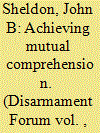

|
|
|
| 2 |
ID:
119953
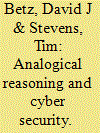

|
|
|
|
|
| Publication |
2013.
|
| Summary/Abstract |
This article is an attempt to interrogate some of the predominant forms of analogical reasoning within current cyber-security discourse, with a view to clarifying their unstated premises, major strengths and, vitally, points of conceptual failure. It seeks to improve dialogue between and across the various epistemic communities involved with cyber-security policy. As we seek to adapt to the new security realities of the information age, it is incumbent upon scholars and strategists to address the benefits of connectivity, in all its dimensions, as much as the threats it presents. Current cyber-security discourse channels us into a winner-takes-all modality that is neither desirable nor necessary in the current strategic reality.
|
|
|
|
|
|
|
|
|
|
|
|
|
|
|
|
| 3 |
ID:
051553
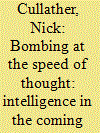

|
|
|
| 4 |
ID:
185564
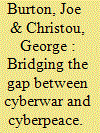

|
|
|
|
|
| Summary/Abstract |
The conceptual debate around the term cyber warfare has dominated the cybersecurity discipline over the last two decades. Much less attention has been given during this period to an equally important question: what constitutes cyber peace? This article draws on the literatures in peace and conflict studies and on desecuritization in critical security studies, to suggest how we might begin to rearticulate the cybersecurity narrative and shift the debate away from securitization and cyberwar to a more academically grounded focus on desecuritization and cyber peace. It is argued that such a move away from a vicious circle where states frame cybersecurity predominantly within a national security narrative and where they seek to perpetually prepare for cyberwar, to a virtual cycle of positive cyber peace, is not only a desirable, but a necessary outcome going forward. We assert that this is particularly important if we are to avoid (continuing) to construct the very vulnerabilities and insecurities that lead to the prioritization of offence and destruction in cyberspace, rather than transformative, human-centred development in information and communications technology innovation.
|
|
|
|
|
|
|
|
|
|
|
|
|
|
|
|
| 5 |
ID:
087244
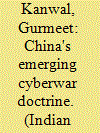

|
|
|
|
|
| Publication |
2009.
|
| Summary/Abstract |
China's cyberwar docrtine is designed to level the playing field in a future war with better equipped Western armed forces.
|
|
|
|
|
|
|
|
|
|
|
|
|
|
|
|
| 6 |
ID:
140555
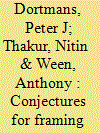

|
|
|
|
|
| Summary/Abstract |
Cyberspace has emerged as a potentially new (and unconventional) domain for warfare. Much debate has focused on understanding cyber conflict. The ability to critically analyse this phenomenon is important; however, the nascent nature of cyberwarfare and the complexity of the systems involved create challenges not met by conventional approaches. As a first step, this requires an analytical construct to frame discussions in a way that highlights distinct characteristics of the cyber domain. An approach proposed is one of the postulating conjectures for debate as a way to achieve this and to demonstrate its use, both at the strategic and operational levels. It is suggested that such an approach provides one component of a mature analytical framework for the analysis of cyber across a range of warfare domains.
|
|
|
|
|
|
|
|
|
|
|
|
|
|
|
|
| 7 |
ID:
186097
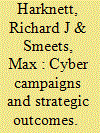

|
|
|
|
|
| Summary/Abstract |
While much focus has remained on the concept of cyberwar, what we have been observing in actual cyber behaviour are campaigns comprised of linked cyber operations, with the specific objective of achieving strategic outcomes without the need of armed attack. These campaigns are not simply transitory clever tactics, but strategic in intent. This article examines strategic cyber competition and reveals how the adoption of a different construct can pivot both explanation and policy prescription. Strategy must be unshackled from the presumption that it deals only with the realm of coercion, militarised crisis, and war in cyberspace.
|
|
|
|
|
|
|
|
|
|
|
|
|
|
|
|
| 8 |
ID:
128705
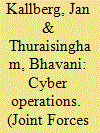

|
|
|
| 9 |
ID:
123912
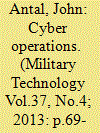

|
|
|
|
|
| Publication |
2013.
|
| Summary/Abstract |
"We are literally at an evolutionery low in violence. State on state conflict is far less likely than it has been in the past. The problem is that other kinds of conflict, other kinds of violence, are exponentially more likely as technology spreades, as the information age allows aorganisations and individuals middleweight nations, if you will to have capabilities that heretofore were the purview of major nations states"
|
|
|
|
|
|
|
|
|
|
|
|
|
|
|
|
| 10 |
ID:
120287
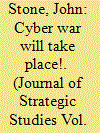

|
|
|
|
|
| Publication |
2013.
|
| Summary/Abstract |
The question of whether or not cyber war amounts to war per se is difficult to determine given strategic theory's uncertain grasp of the concepts of force, violence and lethality. These three concepts, along with their relationships with one another, are explored in order to demonstrate that cyber attacks can in fact be construed as acts of war.
|
|
|
|
|
|
|
|
|
|
|
|
|
|
|
|
| 11 |
ID:
142187
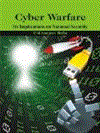

|
|
|
|
|
| Publication |
New Delhi, Vij Books India Pvt Ltd, 2015.
|
| Description |
xv, 245p.hbk
|
| Standard Number |
9789384464820
|
|
|
|
|
|
|
|
|
|
|
|
Copies: C:2/I:0,R:0,Q:0
Circulation
| Accession# | Call# | Current Location | Status | Policy | Location |
| 058402 | 355.343/REL 058402 | Main | On Shelf | General | |
| 058798 | 355.343/REL 058798 | Main | On Shelf | General | |
|
|
|
|
| 12 |
ID:
115218
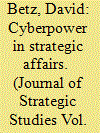

|
|
|
|
|
| Publication |
2012.
|
| Summary/Abstract |
This article explores the effect of connectivity on strategic affairs. It argues that the effect on war's character is potentially, although not yet shown in practice, considerably large. Its effect upon the distribution of power among states in the international system is small, contrary to the claims of `cyberwar' alarmists. All told, however, its effect upon strategic affairs is complex. On the one hand, it represents a significant advance in the `complexification' of state strategies, understood in the sense of the production of intended effects. On the other hand, strategists today - still predominantly concerned with the conflicts and confrontations of states and organised military power - are generally missing the power which non-traditional strategic actors, better adapted to the network flows of the information age, are beginning to deploy. These new forms of organization and coercion will challenge the status quo.
|
|
|
|
|
|
|
|
|
|
|
|
|
|
|
|
| 13 |
ID:
131289
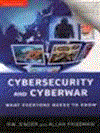

|
|
|
|
|
| Publication |
New Delhi, Oxford University Press, 2014.
|
| Description |
viii, 306p.Pbk
|
| Standard Number |
9780199451654
|
|
|
|
|
|
|
|
|
|
|
|
Copies: C:1/I:1,R:0,Q:0
Circulation
| Accession# | Call# | Current Location | Status | Policy | Location | IssuedTo | DueOn |
| 057761 | 005.8/SIN 057761 | Main | Issued | General | | RA73 | 12-Apr-2024 |
|
|
|
|
| 14 |
ID:
141532
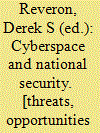

|
|
|
|
|
| Publication |
New Delhi, Satyam Law International, 2013.
|
| Description |
ix, 246p.: ill.pbk
|
| Standard Number |
9789382823001
|
|
|
|
|
|
|
|
|
|
|
|
Copies: C:1/I:0,R:0,Q:0
Circulation
| Accession# | Call# | Current Location | Status | Policy | Location |
| 058334 | 355.033002854678/REV 058334 | Main | On Shelf | General | |
|
|
|
|
| 15 |
ID:
107944
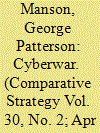

|
|
|
|
|
| Publication |
2011.
|
| Summary/Abstract |
In recent years the People's Republic of China has garnered international attention for its aggressive and often sophisticated employment of cyber capabilities against domestic and international targets alike. With increasing frequency, the targets of Chinese cyber operations are American companies or government networks. If the United States and China find themselves in conflict in the coming decades, this newest arena of operations, cyberwarfare, will play a decisive role in determining the outcome. This article examines the relative cyber strengths and weaknesses each country commands today, and offers policy recommendations for the improvement of the United States' own cyberwar capabilities.
|
|
|
|
|
|
|
|
|
|
|
|
|
|
|
|
| 16 |
ID:
124652
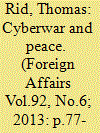

|
|
|
|
|
| Publication |
2013.
|
| Summary/Abstract |
Cyberwar Is Coming!" declared the title of a seminal 1993 article by the RAND Corporation analysts John Arquilla and David Ronfeldt, who argued that the nascent Internet would fundamentally transform warfare. The idea seemed fanciful at the time, and it took more than a decade for members of the U.S. national security establishment to catch on. But once they did, a chorus of voices resounded in the mass media, proclaiming the dawn of the era of cyberwar and warning of its terrifying potential. In February 2011, then CIA Director Leon Panetta warned Congress that "the next Pearl Harbor could very well be a cyberattack." And in late 2012, Mike McConnell, who had served as director of national intelligence under President George W. Bush, warned darkly that the United States could not "wait for the cyber equivalent of the collapse of the World Trade Centers."
|
|
|
|
|
|
|
|
|
|
|
|
|
|
|
|
| 17 |
ID:
110974
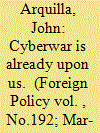

|
|
|
|
|
| Publication |
2012.
|
| Summary/Abstract |
In the nearly 20 years since David Ronfeldt and I introduced our concept of cyberwar, this new mode of conflict has become a reality. Cyberwar is here, and it is here to stay, despite what Thomas Rid and other skeptics think.Back then, we emphasized the growing importance of battlefield information systems and the profound impact their disruption would have in wars large and small. It took just a few years to see how vulnerable the U.S. military had become to this threat. Although most information on cyberwar's repercussions -- most notably the 1997 Eligible Receiver exercise -- remains classified, suffice it to say that their effect on U.S. forces would be crippling.
|
|
|
|
|
|
|
|
|
|
|
|
|
|
|
|
| 18 |
ID:
112454
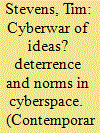

|
|
|
|
|
| Publication |
2012.
|
| Summary/Abstract |
This article relates American efforts to develop strategic 'cyber deterrence' as a means to deter adversarial actions in and through global cyberspace. Thus far, interests- based cyber deterrence theory has failed to translate into effective American policy and strategy, due to a divergence between the operational idiosyncrasies of cyberspace and an over-reliance on Cold War models of deterrence. Even while explicit cyber deterrence strategy falters, the United States is pursuing a normsbased approach to cyber strategy generally, and hopes to derive deterrent effects from its attempts to broker international agreements pertaining to the 'rules of the road' for the proper and productive use of cyberspace. The United States is not the only norm entrepreneur in this policy space, however, and this article examines how a range of other state and non-state actors are complicating efforts to develop normative regimes that might reduce risks to and from cyberspace. The article concludes that a norms-based approach to cyber deterrence might engender deterrent effects at the state level but is unlikely to do so in the case of 'rogue' states and many non-state actors. States will continue, therefore, to develop punitive deterrence capabilities to respond to these actors.
|
|
|
|
|
|
|
|
|
|
|
|
|
|
|
|
| 19 |
ID:
181217
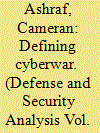

|
|
|
|
|
| Summary/Abstract |
For nearly thirty years scholars have offered changing definitions of cyberwar. The continued ambiguity demonstrates that efforts at establishing definitional clarity have not been successful. As a result, there are many different and contradictory definitions, ranging from cyberwar’s non-existence to cyberwar as an imminent threat. Ongoing definitional ambiguity makes interdisciplinary research and policy communications challenging in this diverse field. Instead of offering a new definition, this paper proposes that cyberwar can be understood through a fluid framework anchored in three themes and five variables identified in a broad interdisciplinary survey of literature. This framework's applicability is demonstrated by constructing an example definition of cyberwar utilising these themes and variables.
|
|
|
|
|
|
|
|
|
|
|
|
|
|
|
|
| 20 |
ID:
047051
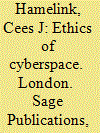

|
|
|
|
|
| Publication |
London, Sage Publications, 2000.
|
| Description |
xi, 207p.
|
| Standard Number |
9780761966692
|
|
|
|
|
|
|
|
|
|
|
|
Copies: C:1/I:0,R:0,Q:0
Circulation
| Accession# | Call# | Current Location | Status | Policy | Location |
| 044469 | 303.4833/HAM 044469 | Main | On Shelf | General | |
|
|
|
|
|
|
|
|
|